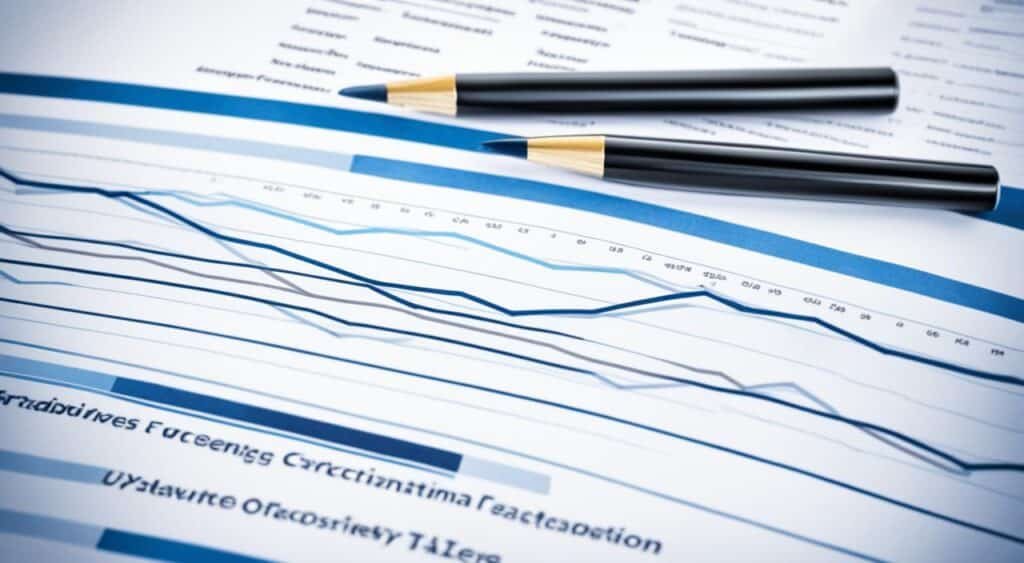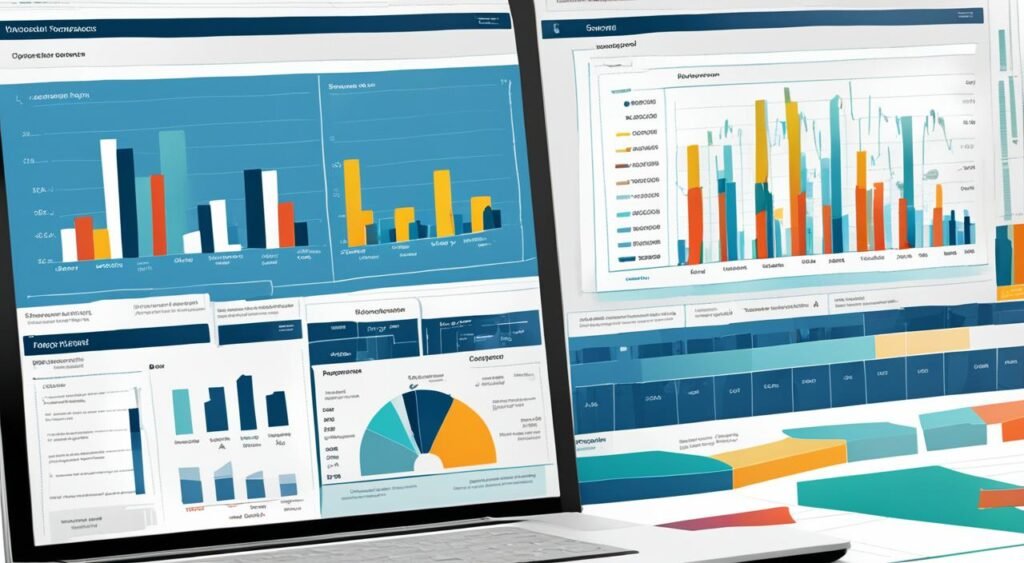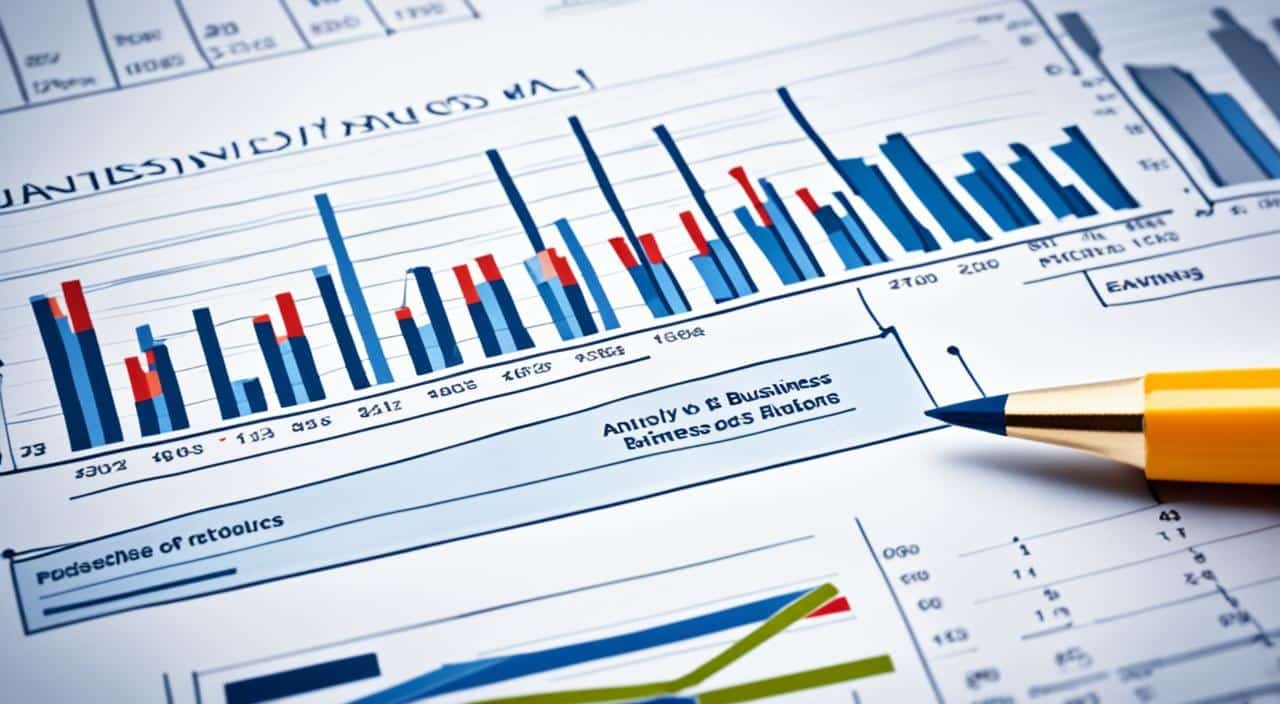In today’s world, businesses must stay ahead, cut costs, and grow. Business analysis is key here. It looks for ways to improve and uses data to solve issues.
Business analysts work between the IT team and business side. They analyze data, processes, and markets to find ways to operate better. By looking at finances, the competition, and what customers do, they guide smarter choices and process improvements.
Key Takeaways
- Business analysis is a critical practice for improving organizational efficiency and driving growth.
- Business analysts use data analysis, process analysis, and market analysis to identify opportunities and solve business problems.
- The goal of business analysis is to enhance decision-making processes and optimize operations through data-driven insights and recommendations.
- Business analysis helps organizations streamline workflows, reduce costs, and gain a competitive edge in the market.
- Effective business analysis requires a combination of analytical, problem-solving, and stakeholder management skills.
Introduction to Business Analysis
Business analysis helps companies get better, faster, and more efficient. It gives advice on how to improve what a company does. Business analysts are key. They bring in changes that make a real difference.
Definition and Overview of Business Analysis
Business analysis looks at what a company needs and suggests ways to fix things. It uses methods like data analysis to understand the company’s issues. Then, it proposes solutions to make things work better.
The Role of a Business Analyst in Organizations
A business analyst links the company’s business and technical sides. They look at what the company and customers need. Then, they advise on making processes better or starting new things. They play a big role in making sure company changes work with its plans.
“Business analysts are the agents of change, responsible for introducing and managing changes within an organization.”
Good business analysts are skilled in data, technology, and people. They make it easier for companies to change and grow. Their role in connecting different parts of a company is key to its success.
Business Analysis Mindset

The business analysis mindset is all about strategic thinking. It helps professionals face tough issues and decide wisely. It’s about using critical thinking and problem-solving. Also, it involves seeing problems in many ways.
Thinking Critically Before Making Decisions
Good business analysts don’t rush into decisions or quick fixes. They first deeply analyze the problem. They look at all sides and what could happen. This includes asking lots of questions, getting the right info, and checking many solutions before they decide.
Understanding Problems from Different Perspectives
Real progress in business analysis comes from seeing issues from all sides. Analysts try to get why different people – like customers, staff, and bosses – think a certain way. By doing this, they really get the big picture of the problem and can offer solutions that work for all.
Getting a business analysis mindset isn’t just for analysts. Everyone in any job can profit from thinking this way when they make choices or solve problems. Using deep thinking and seeing problems from various angles boosts business acumen. It helps people do better in making their organization a success.
“Effective business analysis starts with a willingness to challenge assumptions and explore problems from multiple perspectives.”
Goals of Business Analysis in an Organization

Business analysis is key in helping companies meet their big goals. It looks for chances to work more efficiently, improve how things are done, and save money. Its main aims are to make work smoother and help decision-making.
Improving Operational Efficiency
Business analysts are like problem solvers. They find where a company’s work can be easier and faster. They look closely to spot what’s not working well. Then, they show ways to cut down on time, meet rules better, and waste less. This makes the company work better without spending more money.
Enhancing Decision-Making Processes
An important part of business analysis is giving companies info they can act on. Analysts dig into data and turn it into useful advice. With a clear idea of what’s going on, what the problems are, and how to grow, companies can make smarter choices.
This way, business analysts help companies hit their big targets and do better than others in their field.
“Business analysis is not just about identifying problems; it’s about finding the right solutions that drive tangible business results.”
| Goal | Description | Benefits |
|---|---|---|
| Improving Operational Efficiency | Streamlining processes, eliminating inefficiencies, and enhancing productivity | Reduced costs, improved compliance, and increased overall profitability |
| Enhancing Decision-Making Processes | Providing data-driven insights to support strategic decision-making | Aligning business goals with IT initiatives and making more informed choices |
Benefits of Business Analysis to Organizations

Business analysis helps organizations find chances for improvement, solve big issues, make internal processes better, and cut costs. By looking deeply at data and understanding the business, analysts find what’s not working. Then, they find areas for growth and create solutions that really help.
Identifying Opportunities and Solving Problems
Having a data-driven innovation approach, analysts use their sharp eye to find new chances in a company. They might see new market trends, product lines that need help, or where things are stuck. With their skills, they solve problems by getting to the real issues.
Optimizing Processes and Reducing Costs
Analysts can make operations better by optimizing processes. They look at how things flow and how resources are used, making them more efficient. This can lead to saved money, cutting out unneeded steps, and suggesting smart moves that support growth over time.
| Benefit | Description |
|---|---|
| Opportunity Identification | By digging into data, analysts find new chances for the business to grow and do better. |
| Problem Solving | Taking a strategic, data-focused method, they get to the bottom of issues and come up with fixes. |
| Process Optimization | They make operations smoother and more efficient by analyzing and giving recommendations. |
| Cost Reduction | Analysts cut waste and help spend money smarter, lowering operational costs. |
The advantages go further than these areas. Businesses that use data to make choices and fix problems can boost their standing in the market. Creating a data-driven innovation mindset opens doors to new growth and value for customers.
Business Analysis

In today’s fast-paced world, the link between IT and business operations is vital. Business analysis bridges their gap. It ensures technology supports the organization’s goals and user needs effectively.
Aligning IT and Business Objectives
Business analysts understand both IT’s abilities and what the business needs. They translate the business’s needs to the IT team and vice versa. This links technology use directly to meeting the organization’s goals.
Data-Driven Decision Making
Business analysts use data analysis to make better decisions. Collecting and analyzing data gives them insights for top management. This helps the company run more efficiently and be more competitive.
“Business analysts bridge the gap between IT and the business, ensuring that technology solutions align with strategic objectives and user needs.”
Today, the role of the business analyst is more crucial than ever before. They are key to using technology effectively, achieving strategic goals, making better decisions, and staying ahead in the market.
Key Skills for Business Analysts

Good business analysts have strong skills in understanding, solving issues, talking, and working with all involved. These skills help them make a difference and add value to companies.
Analytical and Problem-Solving Skills
The heart of the job for a business analyst is to collect, analyze, and make sense of data. This lets them find real problems and come up with solutions. Being good at analyzing and solving problems are key. They need these skills to deal with tough issues and spot ways to get better.
- Knowing data analysis methods, like statistics, finding trends, and figuring out the main problems
- Being able to look at big problems, see the details, and come up with new ways to solve them
- Using technology and tools to collect, show, and understand data
Communication and Stakeholder Management
Being good at talking and working with different people is very important for business analysts. They should turn complex info into easy-to-understand messages. Everyone from tech teams to top executives should get what they’re saying.
- Listening well and making talks go smoothly with all involved
- Making reports and updates clear and interesting
- Managing what people expect, solving arguments, and finding agreement
With strong analytical skills, problem-solving know-how, communication abilities, and stakeholder management skills, business analysts can create real change. They can make a significant difference in their organizations.
Business Analysis Certifications and Training

In today’s business world, being ahead is vital. One path to stay on top is by earning businessanalysiscertifications and joining training courses. These confirm your skills and underline your professionalaccreditations.
Key groups like the International Institute of Business Analysis (IIBA), International Qualifications Board for Business Analysis (IQBBA), and International Requirements Engineering Board (IREB) offer training. So do the Project Management Institute (PMI). Their programs test and prove a business analyst’s expertise, making them highly valued.
| Certification | Issuing Organization | Focus Area |
|---|---|---|
| Certified Business Analysis Professional (CBAP) | IIBA | Comprehensive business analysis skills |
| Certified Entry-Level Business Analyst (CEBA) | IIBA | Entry-level business analysis skills |
| Certified Professional for Requirements Engineering (CPRE) | IREB | Requirements engineering and management |
| Certified Business Analysis Professional (CBAP) | PMI | Comprehensive business analysis skills |
Other than certifications, there’s a lot to gain from businessanalysistraining like boot camps and online classes. These options help you brush up on skills. Ensuring you’re ready for today’s business world’s challenges.
“Earning a business analysis certification demonstrates your commitment to the profession and helps you stand out in the job market.”
Starting out or aiming higher? Businessanalysiscertifications are key in your professional growth.
Tools and Techniques Used in Business Analysis

Business analysts use many tools and methods to do their job. They help in gathering data and understanding business needs. Tools like dataanalysis and processmodeling are key. They bridge what a business wants with what technology can do.
Data Analysis and Visualization Tools
Microsoft Excel and Google Sheets are common for dataanalysis. They let analysts work with data easily. For making data clear, tools like Tableau and Power BI are used. They turn numbers into easy-to-understand charts and graphs.
Process Modeling and Requirements Gathering
Understanding how things work now and how they should work guides business analysts. They use techniques such as process mapping and gathering user stories. These tools help them work with others to define what’s needed from a project. It makes sure everyone is on the same page.
| Tool/Technique | Description | Key Benefits |
|---|---|---|
| Microsoft Excel | Spreadsheet software for dataanalysis | Organize, manipulate, and analyze data; create basic visualizations |
| Tableau | Datavisualization software | Create interactive dashboards, charts, and graphs to communicate insights |
| Process Mapping | Processmodeling technique | Visualize and document current workflows and identify improvement opportunities |
| User Stories | Requirementsgathering technique | Capture user needs and requirements in a concise, user-friendly format |
Business analysts combine dataanalysis, datavisualization, processmodeling, and requirementsgathering techniques. Doing so lets them find solutions and improve how things work. These tools and methods are vital for making smart business choices and lasting changes.
Also Read : Effective Business Strategy Essentials for Growth
Career Opportunities in Business Analysis

The business analysis field has many job options. You can start in an entry-level job and move up to senior positions. Job titles include business analyst, business systems analyst, and more. These jobs help companies run better, make smarter choices, and grow.
Job Roles and Salary Expectations
In the U.S., IT businessanalystjobs earn an average of $73,655 a year. But, this can change based on your experience, where you work, and your industry. Big cities like New York and Washington, D.C. often pay more.
Industry Demand and Growth Prospects
Companies are using data more to make decisions. This means the need for businessanalysisprofession skills is growing. Jobs for business analysts were expected to increase 14% by 2029. So, the industrydemand for these skills remains high.
To find more career paths, look into certifications and training. These show you’re serious about your work.
“The business analysis profession offers a diverse range of career paths, with ample opportunities for professional growth and development.”
Case Studies and Real-World Examples

The impact of businessanalysis shines through real cases. These examples show how businessanalysis boosts companies by using data for innovation. They highlight the role of casestudies and realworldexamples in showcasing success.
Take the case of ABC Corporation. It’s a top manufacturer that needed to fix its production line problems. After hiring a businessanalysts team, they spotted what was slowing them down. By looking at the data and models closely, they came up with solutions. These organizationalimprovements made their production smoother, cut waste, and boosted how much they made.
“The insights provided by our businessanalysis team were instrumental in transforming our manufacturing operations. We saw a significant increase in efficiency, coupled with substantial cost savings, which ultimately strengthened our competitive position in the market.”
– Jane Doe, Chief Operating Officer, ABC Corporation
In another story, businessanalysis helped XYZ Retail change digitally. By studying customer data, analysts found out how to make online shopping better. They then put these changes to work. The result? Happier customers, more sales, and a stronger position in the retail race.
| Organization | Challenge | Business Analysis Approach | Outcome |
|---|---|---|---|
| ABC Corporation | Inefficient production processes | Conducted data analysis, identified bottlenecks, and proposed process improvements | Increased efficiency, reduced waste, and improved productivity |
| XYZ Retail | Struggling to adapt to digital transformation | Analyzed customer data, identified opportunities for online presence and improved shopping experience | Increased customer satisfaction, boosted sales, and gained a competitive edge |
These stories underline how powerful businessanalysis can be. With a focus on data and a clear view of how business works, they solve problems and find new chances. This helps companies grow in lasting ways.
Conclusion
Business analysis changes how organizations work, making them more efficient and lowering costs. It helps them grow by using data, good planning, and working smarter. With a business analysis approach and the right tools, experts connect IT with business needs. This makes decisions better and adds more value to the company.
The need for businessanalysis experts is on the rise. It brings many chances for those wanting to help their companies succeed. By focusing on making things better, using datadriveninnovation and good strategicplanning, business analysts are key. They improve how things run and find new paths for growth.
With the business analysis model, companies can fully use their data and become more competitive. They can find the best practices, making them ready for the future. Smart analysis gives companies an edge by helping them make better choices, create new ideas, and adjust to the market.
FAQs
What is business analysis and how can it help improve business?
Business analysis improves how companies work. It makes things smoother, cheaper, and grows the business. By looking at data and planning carefully, business analysts help make better decisions. They play a key role in connecting IT with business needs.
What are the key responsibilities of a business analyst?
Business analysts check how well a company is doing and find ways to make it better. They’re like change leaders, making sure the business keeps improving.
What is the business analysis mindset?
The business analysis mindset is all about solving problems to help a business succeed. It means really understanding problems before coming up with solutions. This approach makes for smarter business choices.
What are the goals of business analysis in an organization?
The main goals of business analysis are better operation and decision making. Analysts look for ways to make processes simpler and save time and money. They then offer up insights to help leaders make smarter choices.
What are the key benefits of business analysis?
Business analysis is a big win for companies. It points out where they can do better and fixes issues, which cuts costs. This leads to smoother operations and a better spot against competitors.
How do business analysts bridge the gap between IT and the business?
Business analysts are the middle link between tech and business goals. They make sure tech solutions meet what the company aims for and user needs. They use data and insights to shape business choices.
What skills are required to be a successful business analyst?
Amazing business analysts are good at solving problems and talking to people. They need to understand data and find solutions that work. Convincing others to act on these ideas is just as important.
What professional certifications and training programs are available for business analysts?
Groups like the IIBA, IQBBA, IREB, and PMI offer training and certifications. These help business analysts prove they’re skilled. It shows they’re serious about their work.
What tools and techniques do business analysts use?
They use many tools, like tools for data and making processes clear. These help them connect what a business needs with what tech can offer.
What are the career opportunities and salary expectations for business analysts?
Business analysis has lots of job types, from new roles to those leading teams. These could be business analyst, IT analyst, or analyst focusing on data. In the U.S., their average yearly pay is about ,655. The best-paid are often in New York, D.C., and Houston. As companies rely more on data, the need for business analysts will keep growing.
Source Links
- https://www.businessanalysisschool.com/post/how-does-business-analysis-add-value-to-an-organization
- https://www.linkedin.com/pulse/business-analysis-mindset-fabricio-laguna-cbap-aac-cpoa-pmp-mba
- https://www.cio.com/article/276798/what-is-a-business-analyst-a-key-role-for-business-it-efficiencywhat-is-a-business-analyst-a-key-role-for-business-it-efficiency.html
